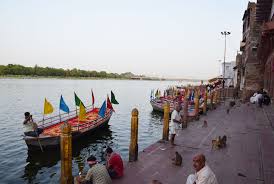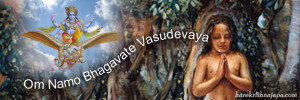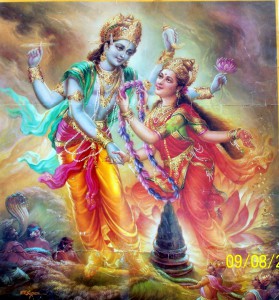Mathurā, one of the most sacred cities in Vedic culture, holds a unique and exalted position among holy places. Its significance is intricately woven into the divine pastimes and teachings of Lord Kṛṣṇa. Below is a detailed exploration of Mathurā’s greatness, as described in various scriptures and the pastimes of the Lord.
The Battle for the Vedas and the Celebration at Prayāga
When the demon Śaṅkhāsura stole the Vedas, the demigods, feeling weakened and spiritually bereft, sought the help of Lord Kṛṣṇa. The Lord, assuming the form of Matsya (a divine fish), battled and defeated Śaṅkhāsura, retrieving the sacred texts. This victory was celebrated with great pomp and a Yajña (sacrifice) at Prayāga, a place where the three holy rivers—Yamunā, Sarasvatī, and the Ganges—converge.
During this grand event, Lord Brahmā, the creator of the universe, declared Prayāga as Tīrtharāja, the king of all holy places. He commanded that all sacred sites bow down to Prayāga. However, two significant holy places, Mathurā and Vṛndāvan, did not attend this ceremony, leading to an important lesson in humility and the exalted status of Mathurā.
Nārada Muni’s Wisdom and Mathurā’s Superiority
Nārada Muni, the great sage, noticed that Prayāga was becoming proud after receiving the title of Tīrtharāja. To curb this pride, Nārada informed Prayāga that Mathurā and Vṛndāvan had not acknowledged his new title. Concerned, Prayāga approached Lord Kṛṣṇa, complaining that Mathurā and Vṛndāvan had not honored him as Tīrtharāja.
Lord Kṛṣṇa, smiling, explained to Prayāga that while he could be the king of all holy places, he could not claim dominion over Mathurā and Vṛndāvan, as these were His personal residences. Mathurā, in particular, is the eternal abode of the Lord, beyond the reach of cosmic devastation. Kṛṣṇa declared:
“Mathurā Maṇḍala is My home. It is My transcendental abode, above the three worlds. It is not destroyed even at the time of cosmic devastation. Like Me, Mathurā is eternal.”
This verse underscores the unique status of Mathurā, where the Lord Himself takes birth and performs His divine pastimes, including His appearance on Janmāṣṭamī. Thus, Mathurā is not just a holy city but the eternal home of the Supreme Personality of Godhead, Śrī Kṛṣṇa.
The Humility of Prayāga
Chastised by the Lord, Prayāga became humble and sought forgiveness from Mathurā and Vṛndāvan. He approached them, offering full obeisances on the dusty roads of Vraja-Maṇḍala, recognizing their superior spiritual status. The personified Mathurā advised Prayāga to undertake the Vraja-Maṇḍala Parikramā (circumambulation of the sacred land of Vṛndāvan and Mathurā) to purify his heart and develop Prema-Bhakti (pure love) for Rādhā and Kṛṣṇa.
The Lesson of Bhūmi Devī
Even Bhūmi Devī (Mother Earth) questioned why Mathurā and Vṛndāvan were considered the most sacred among all holy places. The Lord decided to teach her a lesson during the time when the demon Hiraṇyākṣa threw the Earth to the bottom of the universe. Lord Varāha, in His boar incarnation, rescued Bhūmi from the depths and, pausing in the sky, showed her a vision of Mathurā, untouched and resplendent even in the midst of cosmic floods. This revealed to Bhūmi Devī that Mathurā is not an ordinary place but an eternal, divine abode, always filled with beauty and spiritual energy.
Conclusion: The Supreme Glory of Mathurā
The greatness of Mathurā is unparalleled. It is the eternal home of Lord Kṛṣṇa, the place of His divine birth, and the site of countless sacred pastimes. The teachings and pastimes associated with Mathurā remind devotees of the importance of humility, the boundless mercy of the Lord, and the supreme sanctity of this holy land.
Prayer for Devotion in Mathurā
“O Supreme Lord, Śrī Kṛṣṇa, who eternally resides in Mathurā, we bow down at Your lotus feet and humbly seek Your blessings. Grant us the fortune to always remember Your divine pastimes in Mathurā and to cultivate deep love and devotion for You. May our hearts be purified as we chant Your holy names and contemplate the glories of Mathurā, the land where You eternally dwell. Jai Śrī Mathurā Maṇḍala! Jai Śrī Kṛṣṇa!”
Quote from Śrīmad Bhāgavatam:
“yat-pāda-paṅkaja-palāśa-vilāsa-bhaktyā
karmaśrayaṁ grathitam udgrathayanti santaḥ
tadvan na rikta-matayo yatayo ‘pi ruddha-
sroto-gaṇās tam araṇaṁ bhaja vāsudevam”
Translation: “The devotees, who are constantly engaged in the transcendental loving service of the Lord, rid themselves of the root cause of karma by engaging in His service. Therefore, worship Vāsudeva, the Supreme Lord, with full surrender and devotion.”
This passage reflects the ultimate spiritual truth that Mathurā embodies—the eternal presence and grace of the Supreme Lord, accessible to all who seek refuge in Him with sincere devotion.



